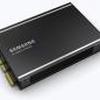Samsung unveiled the industry's first memory module supporting the new Compute Express Link (CXL) interconnect standard. Integrated with Samsung's Double Data Rate 5 (DDR5) technology, this CXL-based module will enable server systems to significantly scale memory capacity and bandwidth.
The rise of AI and big data has been fueling the trend toward heterogeneous computing, where multiple processors work in parallel to process massive volumes of data. CXL—an open, industry-supported interconnect based on the PCI Express (PCIe) 5.0 interface—enables high-speed, low latency communication between the host processor and devices such as accelerators, memory buffers and smart I/O devices, while expanding memory capacity and bandwidth well beyond what is possible today. Samsung has been collaborating with several data center, server and chipset manufacturers to develop next-generation interface technology since the CXL consortium was formed in 2019.
"This is the industry's first DRAM-based memory solution that runs on the CXL interface, which will play a critical role in serving data-intensive applications including AI and machine learning in data centers as well as cloud environments," said Cheolmin Park, vice president of the Memory Product Planning Team at Samsung Electronics. "Samsung will continue to raise the bar with memory interface innovation and capacity scaling to help our customers, and the industry at-large, better manage the demands of larger, more complex, real-time workloads that are key to AI and the data centers of tomorrow."
Dr. Debendra Das Sharma, Intel Fellow and Director of I/O Technology and Standards at Intel said, "Data center architecture is rapidly evolving to support the growing demand and workloads for AI and ML, and CXL memory is expected to expand the use of memory to a new level. We continue to work with industry companies such as Samsung to develop a robust memory ecosystem around CXL."
Dan McNamara, senior vice president and general manager, Server Business Unit, AMD, added, "AMD is committed to driving the next generation of performance in cloud and enterprise computing. Memory research is a critical piece to unlocking this performance, and we are excited to work with Samsung to deliver advanced interconnect technology to our data center customers."
Unlike conventional DDR-based memory, which has limited memory channels, Samsung's CXL-enabled DDR5 module can scale memory capacity to the terabyte level, while dramatically reducing system latency caused by memory caching.
In addition to CXL hardware innovation, Samsung has incorporated several controller and software technologies like memory mapping, interface converting and error management, which will allow CPUs or GPUs to recognize the CXL-based memory and utilize it as the main memory.
Samsung's new module has been successfully validated on next-generation server platforms from Intel, signaling the beginning of an era for high-bandwidth, low latency CXL-based memory using the latest DDR5 standard. Samsung is also working with data center and cloud providers around the world to better accommodate the need for greater memory capacity that will be essential in handling big data applications including in-memory database systems.
As the DDR5-based CXL memory module becomes commercialized, Samsung intends to lead the industry in meeting the demand for next-generation high-performance computing technologies that rely on expanded memory capacity and bandwidth.


